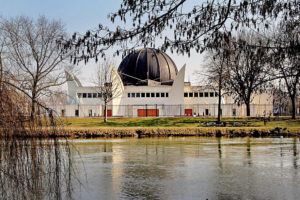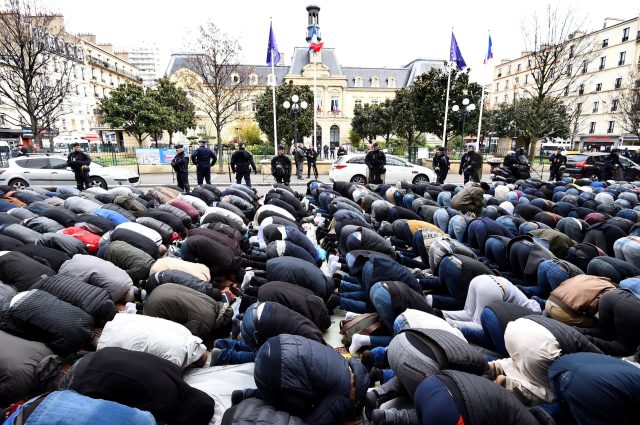There aren’t enough mosques for France’s Muslims. Photo credit should read BERTRAND GUAY/AFP via Getty Images

France has a serious mosque problem. There are not enough of them to go around.
Some of the country’s 6,000,000 Muslims worship in informal prayer rooms which occasionally become breeding grounds for radical, anti-western Islamist teaching. Financing new mosques is difficult in a secular country where public subsidies for religion are banned.
In any case, planning permission is systematically opposed by a range of Right-wing politicians, who also complain when Muslim prayers spill over into the street.
So a decision in 2013 to build Europe’s biggest mosque in Strasbourg — with the blessing of national and local politicians — seemed at the time to be an important breakthrough. Work began four years ago in an unlovely industrial estate on the southern fringes of the Alsatian capital; the Turkish Prime Minister was present, as were French national and local officials.
Construction of the Very Big Mosque — described ambitiously by its promoters as a rival to the magnificent 12th century red-stone Strasbourg Cathedral — was haphazard. Eight of the 30 domes were completed. The bases of two minarets appeared.
Building halted in 2020 and resumed this year – but stopped again last month in the midst of a many-sided political row stretching from Alsace to Paris to Ankara. Everyone involved now accuses everyone else of acting in bad faith; everyone seems to be partially right and partially wrong.
In the background — not very far in the background — is President Emmanuel Macron’s campaign to curb the spread of extremist Islamic ideology in France. Further in the background (again, not much further) are the presidential elections next April and May in which the far-Right leader Marine Le Pen hopes to exploit fear of radical Islam — and Islamophobia more generally — to reach the Elysée Palace.
The row over the Grande Mosquée de Strasbourg is, however, confusing and elusive. Macron’s interior minister Gérald Darmanin said last month that the mosque was “part of a project to impose political Islam” in France.
Is he right? Not really. The mosque’s Franco-Turkish promoters, although ultra-conservative, have nothing to do with the anti-western, jihadist ideology which has generated more than 30 terrorist attacks in France in the last six years. Almost all were committed by radicalised French or foreign-born Muslims linked to France’s 5,000,000 or so people of North African or Arab descent.
The Strasbourg mega-mosque is the project of the 700,000-strong French community of Turkish origin, which is heavily concentrated in Alsace. No Franco-Turk has been involved in any of the jihadist attacks in France, although some have been accused of acts of intra-Turkish or anti-Kurdish terrorism on French soil.
The big row over the big mosque is part of a separate, but interwoven, confrontation between France and Turkey and in particular between President Macron and President Recep Tayyip Erdoğan. The two men have frequently wrangled and exchanged insults in the last two years over their two countries’ involvement in the Libyan conflict or illegal Turkish exploration for gas deposits in Greek territorial waters.
Turkey experts say that Erdoğan does have a political project in Europe, but it is about national influence and his own hold on power in Ankara, not the advance of Islam. His aim is to impose his own conservative nationalist interpretation of the Islamic faith on the large Turkish diaspora in Germany, France and other countries.
“The Turkish Government wanted to use this mosque as a kind of soft power,” said Erkan Toguslu, an expert on Turkish affairs at Leuven university in Belgium. “Erdoğan’s aim is not so much religious as nationalist.”
President Erdogan and the Turkish Government are, however, no longer directly involved in the Strasbourg Mosque. The ultra-conservative Turkish movement behind the project, Milli Görüs, has been close to Erdogan at various periods in the past, but Ankara cut off funding for the Grande Mosquée after falling out with Milli Görüs in Turkey last year.
So a bizarre situation has arisen. Successive French governments and local administrations gave their enthusiastic blessing to the Big Mosque when it was linked to Erdogan; after Erdogan ended his involvement it became, according to interior minister Darmanin, a Turkish Trojan Horse — an example of “foreign meddling on our soil”.

When they lost access to funds from Ankara, the mosque’s promoters asked for money from a newly-elected Green and Socialist administration at Strasbourg town hall. Previous local administrations of Right and Left had offered money for the mosque but were turned down. The new Green mayor, Jeanne Barseghian, agreed in principal to make a € 3mcontribution – almost 10% of the total cost.
Although public funding of religious projects is illegal under France’s 1905 “secularity” law, Alsace was not part of France at the time, having been annexed by Germany after the Franco-Prussian War in 1870.
When Alsace returned to France in 1919, it preserved some of its own laws and characteristics, and to this days Alsatian trains run on the right-hand track, as they do in Germany, not on the left as they do in most of France. The German-speaking province also retains a Napoleonic-era right to public funding of religious projects.
There was therefore nothing illegal in the decision earlier this year of the Green mayor of Strasbourg to promise the funds – yet all hell let loose all the same.
Darmanin and other members of the government accused Ms Barseghian of being politically naïve. The far-Right accused her of surrendering to so-called islamogauchisme (an alleged unholy alliance between radical Islam and the Left).
She received death threats from the ultra-Right, and was also bitterly criticised by French-Armenians — of which is she one — for helping an association which refuses to recognise the post-1915 genocide of Armenians in the Ottoman Empire.
The man who leads the organisation which is building the mosque says that Mayor Barseghian has been the victim of shameless political hypocrisy. “Almost every other local political party has offered to helps us in the past,” said Eyüp Sahin, head of the Milli Görüs federation in the eastern region of France. “She never promised anything beforehand. Now they are attacking her.”
Milli Görüs has now withdrawn its request for money from the Strasbourg city authorities and, as a result, Mr Sahin says that completion of the giant mosque will be delayed until 2024 or 2025.
“It has become impossible to deal with French politics and politicians,” he said. “If we seek to raise money abroad, we are attacked. When we seek local money, the sky falls in.
“When it suits them, we are French; when it doesn’t suit them, we are Turks. They demand integration. Well, we are integrated. My accent may not be French but it’s not Turkish either. It’s Alsatian.”
Mr Sahin protests a little too much, however. His organisation, Milli Görüs, is a powerful German-based movement which promotes a very conservative interpretation of Islam and seeks to preserve the Turkishness of the diaspora in Europe into the second, third and fourth generations.
Milli Görüs itself means “national dream”, and the nation that the title refers to is neither France nor Germany.
As part of President Macron’s drive to curb the growing extreme Islamist influence in France, more than a dozen Muslim organisations were asked to sign a charter earlier this year – the Charter for the Principles of French Islam — which rejects foreign influence and recognises the primacy of democracy and secular laws over sharia law. Only three refused, including Milli Görüs and another Turkish organisation even more closely associated with the Turkish state.
The balkanisation of France’s Muslim community into organisations linked directly or partly to countries of origin was once encouraged by French governments. It is now recognised as part of the problem. There already is, for instance, a big mosque in Strasbourg which is also called confusingly “La Grande Mosquée”, and which attracts worshippers from the local Maghrebin (North African) communities but not Franco-Turks.
Interior minister Mr Darmanin is threatening to dissolve Milli Görüs, as an organisation which refuses the supremacy of French law and is “tied to a foreign power”. Samim Akgönül, head of Turkish studies as Strasbourg university, says that Darmanin is missing the point and missing a trick.
Since Milli Görüs seems to have parted ways with Erdogan the French government should be finding ways, he says, to draw them into French life, not push them away.
“By refusing to consider these populations as part of French society, we are giving them up to Turkey. But in truth they are Strasbourgers,” Mr Akgönül said.
Another academic who knows Turkey well, but who asked not to be named, said that the Strasbourg Mosque row, far from curbing Erdogan’s power, was playing into his hands. “Erdogan uses France in the same way that the Johnson government does in Britain,” he said. “For both of them, stirring up anti-French feeling is a useful way of stirring up national feeling.”
President Macron’s drive to restrain extremist Islamist ideology in France was necessary and well-intentioned.
It was grotesquely misrepresented in some parts of the Muslim world – and by liberal media in the United States. Unfortunately, however, Macron has allowed his ambitious interior minister to muddle the issue with tough-man posturing – on the Strasbourg Mosque and other issues.
The big, and often misleading, row over the big mosque is part of a wider and dangerous polarisation of attitudes to Islam in France. The far-Right and even part of the traditional Right exploit Islamist excesses and exaggerate Islamist influence to disguise and promote more generalised Islamophobia. Meanwhile, part of the Left refuses to admit that violent, Islamist ideology is advancing — or even that it exists.
The Strasbourg row is confusing — far more than it needed to be — but that’s not surprising. As the 2022 elections approach, it has become increasingly impossible to speak rationally about Islam in France.










Join the discussion
Join like minded readers that support our journalism by becoming a paid subscriber
To join the discussion in the comments, become a paid subscriber.
Join like minded readers that support our journalism, read unlimited articles and enjoy other subscriber-only benefits.
Subscribe